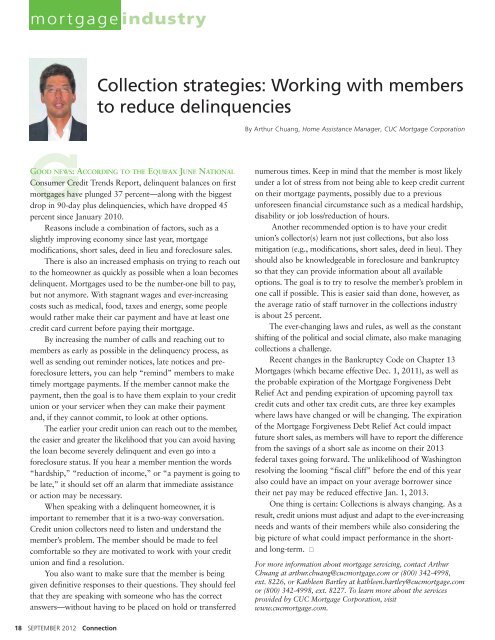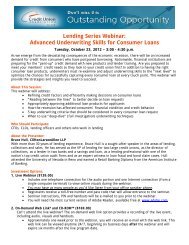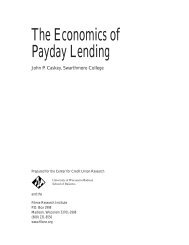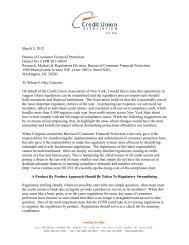Published by the Credit Union Association of New York
Published by the Credit Union Association of New York
Published by the Credit Union Association of New York
Create successful ePaper yourself
Turn your PDF publications into a flip-book with our unique Google optimized e-Paper software.
mortgageindustry<br />
Collection strategies: Working with members<br />
to reduce delinquencies<br />
By Arthur Chuang, Home Assistance Manager, CUC Mortgage Corporation<br />
GGOOD NEWS: ACCORDING TO THE EQUIFAX JUNE NATIONAL<br />
Consumer <strong>Credit</strong> Trends Report, delinquent balances on first<br />
mortgages have plunged 37 percent—along with <strong>the</strong> biggest<br />
drop in 90-day plus delinquencies, which have dropped 45<br />
percent since January 2010.<br />
Reasons include a combination <strong>of</strong> factors, such as a<br />
slightly improving economy since last year, mortgage<br />
modifications, short sales, deed in lieu and foreclosure sales.<br />
There is also an increased emphasis on trying to reach out<br />
to <strong>the</strong> homeowner as quickly as possible when a loan becomes<br />
delinquent. Mortgages used to be <strong>the</strong> number-one bill to pay,<br />
but not anymore. With stagnant wages and ever-increasing<br />
costs such as medical, food, taxes and energy, some people<br />
would ra<strong>the</strong>r make <strong>the</strong>ir car payment and have at least one<br />
credit card current before paying <strong>the</strong>ir mortgage.<br />
By increasing <strong>the</strong> number <strong>of</strong> calls and reaching out to<br />
members as early as possible in <strong>the</strong> delinquency process, as<br />
well as sending out reminder notices, late notices and preforeclosure<br />
letters, you can help “remind” members to make<br />
timely mortgage payments. If <strong>the</strong> member cannot make <strong>the</strong><br />
payment, <strong>the</strong>n <strong>the</strong> goal is to have <strong>the</strong>m explain to your credit<br />
union or your servicer when <strong>the</strong>y can make <strong>the</strong>ir payment<br />
and, if <strong>the</strong>y cannot commit, to look at o<strong>the</strong>r options.<br />
The earlier your credit union can reach out to <strong>the</strong> member,<br />
<strong>the</strong> easier and greater <strong>the</strong> likelihood that you can avoid having<br />
<strong>the</strong> loan become severely delinquent and even go into a<br />
foreclosure status. If you hear a member mention <strong>the</strong> words<br />
“hardship,” “reduction <strong>of</strong> income,” or “a payment is going to<br />
be late,” it should set <strong>of</strong>f an alarm that immediate assistance<br />
or action may be necessary.<br />
When speaking with a delinquent homeowner, it is<br />
important to remember that it is a two-way conversation.<br />
<strong>Credit</strong> union collectors need to listen and understand <strong>the</strong><br />
member’s problem. The member should be made to feel<br />
comfortable so <strong>the</strong>y are motivated to work with your credit<br />
union and find a resolution.<br />
You also want to make sure that <strong>the</strong> member is being<br />
given definitive responses to <strong>the</strong>ir questions. They should feel<br />
that <strong>the</strong>y are speaking with someone who has <strong>the</strong> correct<br />
answers—without having to be placed on hold or transferred<br />
numerous times. Keep in mind that <strong>the</strong> member is most likely<br />
under a lot <strong>of</strong> stress from not being able to keep credit current<br />
on <strong>the</strong>ir mortgage payments, possibly due to a previous<br />
unforeseen financial circumstance such as a medical hardship,<br />
disability or job loss/reduction <strong>of</strong> hours.<br />
Ano<strong>the</strong>r recommended option is to have your credit<br />
union’s collector(s) learn not just collections, but also loss<br />
mitigation (e.g., modifications, short sales, deed in lieu). They<br />
should also be knowledgeable in foreclosure and bankruptcy<br />
so that <strong>the</strong>y can provide information about all available<br />
options. The goal is to try to resolve <strong>the</strong> member’s problem in<br />
one call if possible. This is easier said than done, however, as<br />
<strong>the</strong> average ratio <strong>of</strong> staff turnover in <strong>the</strong> collections industry<br />
is about 25 percent.<br />
The ever-changing laws and rules, as well as <strong>the</strong> constant<br />
shifting <strong>of</strong> <strong>the</strong> political and social climate, also make managing<br />
collections a challenge.<br />
Recent changes in <strong>the</strong> Bankruptcy Code on Chapter 13<br />
Mortgages (which became effective Dec. 1, 2011), as well as<br />
<strong>the</strong> probable expiration <strong>of</strong> <strong>the</strong> Mortgage Forgiveness Debt<br />
Relief Act and pending expiration <strong>of</strong> upcoming payroll tax<br />
credit cuts and o<strong>the</strong>r tax credit cuts, are three key examples<br />
where laws have changed or will be changing. The expiration<br />
<strong>of</strong> <strong>the</strong> Mortgage Forgiveness Debt Relief Act could impact<br />
future short sales, as members will have to report <strong>the</strong> difference<br />
from <strong>the</strong> savings <strong>of</strong> a short sale as income on <strong>the</strong>ir 2013<br />
federal taxes going forward. The unlikelihood <strong>of</strong> Washington<br />
resolving <strong>the</strong> looming “fiscal cliff” before <strong>the</strong> end <strong>of</strong> this year<br />
also could have an impact on your average borrower since<br />
<strong>the</strong>ir net pay may be reduced effective Jan. 1, 2013.<br />
One thing is certain: Collections is always changing. As a<br />
result, credit unions must adjust and adapt to <strong>the</strong> ever-increasing<br />
needs and wants <strong>of</strong> <strong>the</strong>ir members while also considering <strong>the</strong><br />
big picture <strong>of</strong> what could impact performance in <strong>the</strong> shortand<br />
long-term. ■<br />
For more information about mortgage servicing, contact Arthur<br />
Chuang at arthur.chuang@cucmortgage.com or (800) 342-4998,<br />
ext. 8226, or Kathleen Bartley at kathleen.bartley@cucmortgage.com<br />
or (800) 342-4998, ext. 8227. To learn more about <strong>the</strong> services<br />
provided <strong>by</strong> CUC Mortgage Corporation, visit<br />
www.cucmortgage.com.<br />
18 SEPTEMBER 2012 Connection






